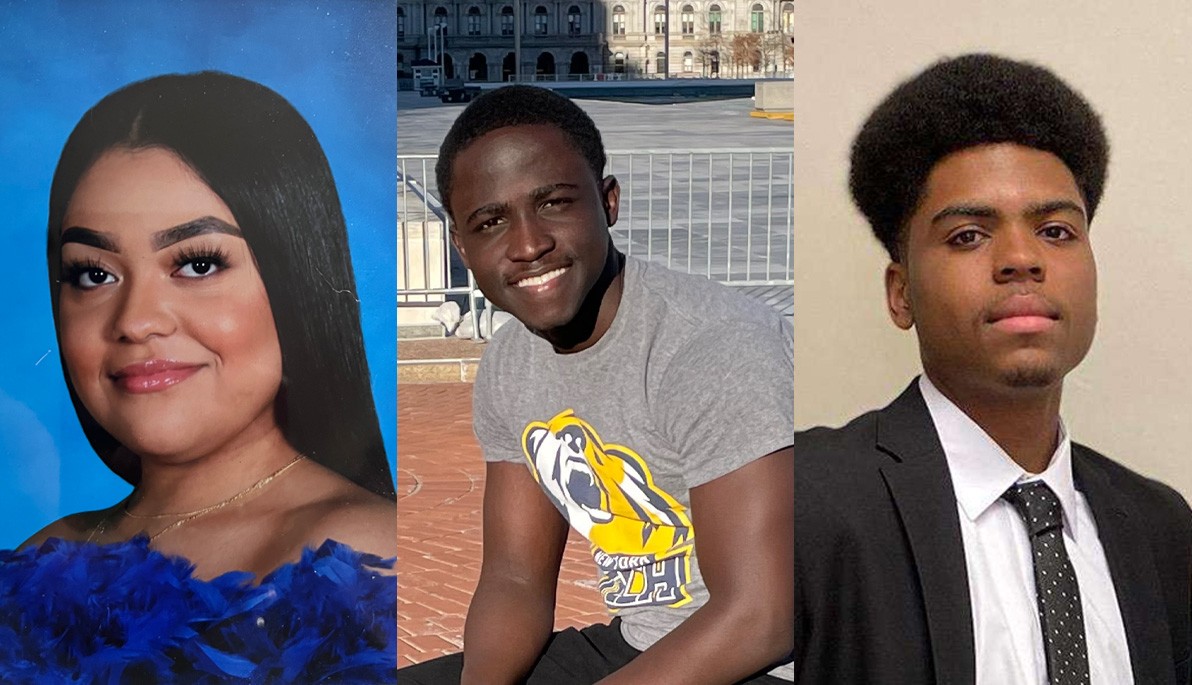News
Student Aid Advocacy Day: Amplifying Voices for Educational Equity
February 26, 2024
Pictured from left: Leeanie Cruz, Clement Banahene, and Billie Williams attended Student Aid Advocacy Day on February 13.
Advocacy is crucial for several reasons and plays a vital role in promoting justice and equity in society by amplifying voices, influencing policies, and driving meaningful change.
This principle took center stage on February 13, in Albany, N.Y., as college students converged (via Zoom, due to inclement weather) to advocate for prioritized educational funding in the forthcoming state budget. Hosted by the Commission on Independent Colleges and Universities in New York, the annual Student Aid Advocacy Day provided a platform for beneficiaries of state student aid to articulate their concerns and advocate for meaningful change. Key topics of discussion included the effects on programs such as TAP (Tuition Assistance Program), HEOP (Higher Education Opportunity Program), STEP/CSTEP (Collegiate Science and Technology Entry Program), and Bundy Aid.
Among the voices heard that day were New York Tech students Clement Banahene (electrical and computer engineering technology), who attended for the third time; Leeanie Cruz (business administration — marketing), her first time; and Billie Williams (electrical and computer engineering technology), his second.
They spoke to New York Tech News about their experience and why they feel it’s important to get involved.
Why is advocacy important? Why is it important to make sure your voice is heard?
Billie Williams (BW): The representation students have is important because it allows their voices to be heard regarding processes that affect them personally. Being involved in educational policymaking decisions allows students to bring about change within their own and many other higher education school communities. I also believe that it’s an important responsibility to advocate for changes that lead to a more equitable society.
Clement Banahene (CB): As a student, advocacy is crucial for ensuring that our educational experience meets our needs and supports our goals. By making sure my voice is heard, I can advocate for changes, such as improved resources, more inclusive policies, and a supportive learning environment, ultimately enhancing our academic journey and contributing to positive change for myself and my peers.
Leeanie Cruz (LC): Many people might struggle with where or how to start when it comes to advocacy. Being able to advocate is very important for us in this modern-day society; it is very easy for many struggles to go unnoticed. Having the platforms and connections that open doors or raise a flag for our needs is an amazing opportunity.
How did it feel speaking directly to legislators’ offices?
BW: It felt amazing to speak directly to the legislators’ offices and to advocate for specific policy changes. It allowed me and my peers to provide a personal perspective that highlighted certain needs we have as college students that the legislators themselves may be unaware of and bring more awareness to the importance of those needs. I believe by sharing our personal experiences, we have a greater input on the decision-making process.
CB: Speaking directly to legislators’ offices feels empowering and meaningful. It’s an opportunity to directly influence decision-making processes and advocate for issues that matter to me. While it can be nerve-wracking, knowing that I’m making my voice heard on important matters is incredibly fulfilling. Overall, it’s a valuable experience in civic engagement and leaves me feeling like I’m actively contributing to positive change.
What was your biggest takeaway from participating in Student Aid Advocacy Day?
BW: The impact individual student voices have on legislative policy decisions. Advocacy efforts, such as meeting with legislators, sharing personal stories, and advocating for specific policies, can directly influence lawmakers’ decisions regarding student aid. I believe that with my continued advocacy efforts, I am actively contributing to a change that will impact all higher education students.
CB: Participating in Student Aid Advocacy Day for the third time emphasizes my dedication to advocating for students’ rights and needs. It shows that I’m committed to making a positive impact on education policy and ensuring that students’ voices are heard and valued in decision-making processes. With each advocacy effort, I’m contributing to creating a more equitable and supportive educational environment for all students.
LC: It’s easy for [a student’s] struggles and needs to slip through [the crack] and become another statistic or another failed student. Having the ability and the opportunity to not only have your voice heard but also be a pillar for your peers and others who don’t have a platform is remarkable. It is important to shed light on the needs and struggles that one faces within their college journey. Student Aid Advocacy Day shows that there are many others in similar situations and people willing to vouch for those in need.
This interview has been edited and condensed.




